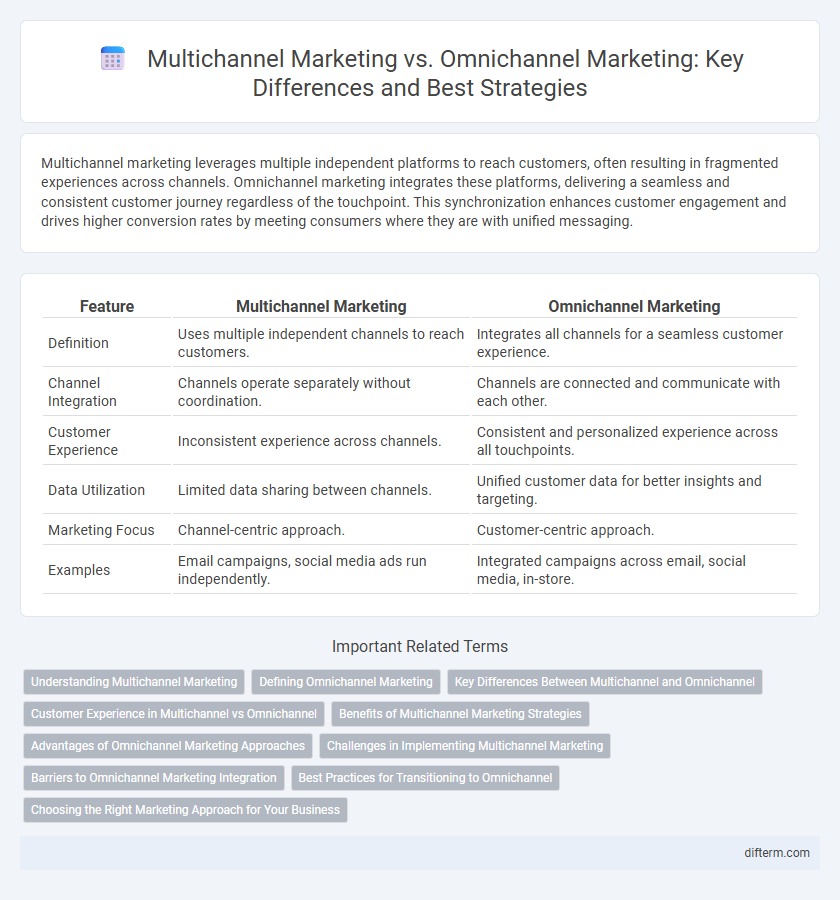Multichannel marketing leverages multiple independent platforms to reach customers, often resulting in fragmented experiences across channels. Omnichannel marketing integrates these platforms, delivering a seamless and consistent customer journey regardless of the touchpoint. This synchronization enhances customer engagement and drives higher conversion rates by meeting consumers where they are with unified messaging.
Table of Comparison
| Feature | Multichannel Marketing | Omnichannel Marketing |
|---|---|---|
| Definition | Uses multiple independent channels to reach customers. | Integrates all channels for a seamless customer experience. |
| Channel Integration | Channels operate separately without coordination. | Channels are connected and communicate with each other. |
| Customer Experience | Inconsistent experience across channels. | Consistent and personalized experience across all touchpoints. |
| Data Utilization | Limited data sharing between channels. | Unified customer data for better insights and targeting. |
| Marketing Focus | Channel-centric approach. | Customer-centric approach. |
| Examples | Email campaigns, social media ads run independently. | Integrated campaigns across email, social media, in-store. |
Understanding Multichannel Marketing
Multichannel marketing involves engaging customers across multiple independent platforms such as social media, email, and retail stores, each with distinct messaging and goals. This strategy maximizes brand exposure but often results in fragmented customer experiences due to lack of integration between channels. Businesses leveraging multichannel marketing aim to reach diverse audiences while maintaining channel-specific content tailored to user behavior on each platform.
Defining Omnichannel Marketing
Omnichannel marketing integrates customer interactions across multiple channels, creating a seamless and consistent brand experience regardless of the touchpoint. This strategy leverages data analytics and customer insights to personalize communication and unify messaging, enhancing customer engagement, loyalty, and lifetime value. Unlike multichannel marketing, which operates channels independently, omnichannel marketing ensures full connectivity and synchronization between online, offline, mobile, social media, and in-store platforms.
Key Differences Between Multichannel and Omnichannel
Multichannel marketing involves using multiple independent channels to reach customers, such as email, social media, and physical stores, each operating in silos without integration. Omnichannel marketing creates a seamless and unified customer experience by integrating all channels, allowing smooth transitions across touchpoints with consistent messaging. The key difference lies in customer journey cohesion, where omnichannel prioritizes synchronization and personalization across devices and platforms, enhancing engagement and conversion rates.
Customer Experience in Multichannel vs Omnichannel
Multichannel marketing delivers brand messages across multiple independent channels, often creating fragmented customer experiences with inconsistent messaging and interactions. Omnichannel marketing integrates these channels into a seamless, unified experience, ensuring personalized and consistent engagement that enhances customer satisfaction and loyalty. This holistic approach leverages data synchronization and real-time customer insights to optimize touchpoints across devices and platforms.
Benefits of Multichannel Marketing Strategies
Multichannel marketing strategies enable businesses to reach diverse customer segments by utilizing multiple independent channels such as social media, email, and in-store promotions, increasing overall brand visibility. This approach allows for tailored messaging specific to each platform, enhancing customer engagement and driving higher conversion rates. By leveraging a variety of touchpoints, companies can gather comprehensive data insights to optimize marketing efforts and improve return on investment.
Advantages of Omnichannel Marketing Approaches
Omnichannel marketing enhances customer experience by delivering a seamless and consistent interaction across all platforms, increasing engagement and loyalty. It enables businesses to gather integrated data from multiple touchpoints, allowing personalized and targeted campaigns that improve conversion rates. This unified approach also streamlines marketing efforts and resource allocation, leading to higher operational efficiency compared to traditional multichannel strategies.
Challenges in Implementing Multichannel Marketing
Implementing multichannel marketing poses challenges such as inconsistent brand messaging across platforms, difficulties in tracking customer interactions, and fragmented data that hinders a unified customer view. Marketing teams often struggle with coordinating campaigns among diverse channels like social media, email, and in-store promotions, leading to inefficiencies. These issues can result in poor customer experiences and lower campaign effectiveness compared to more integrated omnichannel strategies.
Barriers to Omnichannel Marketing Integration
Barriers to omnichannel marketing integration often include disparate data systems that hinder seamless customer experience and the lack of unified technology platforms across marketing channels. Organizations struggle with siloed departments and inconsistent messaging, which disrupt the cohesive brand interaction essential for omnichannel strategies. Overcoming these challenges requires investment in integrated CRM systems and cross-functional collaboration to ensure real-time data synchronization and personalized customer journeys.
Best Practices for Transitioning to Omnichannel
Successfully transitioning from multichannel to omnichannel marketing requires integrating data across all customer touchpoints to create a seamless and personalized experience. Implementing a unified customer relationship management (CRM) system helps synchronize messaging, track interactions, and optimize customer journeys in real-time. Focusing on consistent branding and leveraging advanced analytics enables marketers to deliver targeted content that enhances engagement and drives conversions.
Choosing the Right Marketing Approach for Your Business
Multichannel marketing involves using multiple separate channels to reach customers, while omnichannel marketing integrates these channels to provide a seamless and consistent customer experience. Businesses aiming to enhance customer engagement and streamline communications should consider omnichannel strategies, as they unify touchpoints across social media, email, in-store, and mobile platforms. Selecting the right approach depends on your business goals, customer preferences, and available resources to ensure personalized and cohesive brand interactions.
Multichannel Marketing vs Omnichannel Marketing Infographic

 difterm.com
difterm.com